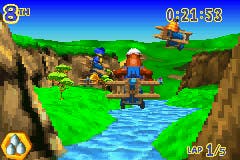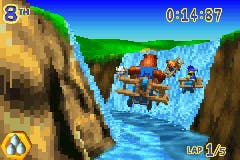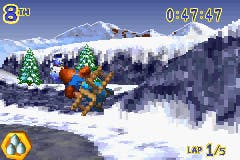Banjo Pilot
Will Rare's fourth GBA title fly off the shelves?
Order yours now from Simply Games.
Four GBA titles on from that megabucks deal, the long-awaited arrival of Banjo Pilot says more about the current shenanigans at Rare central than any amount of scurrilous gossip could generate about what Microsoft got for its $375 million and what the hell's going on with various Xbox titles. That the once-prolific and heroic developer finds itself having to continually redesign its Xbox titles must be irritating enough for all concerned, but to be reduced to the humbling anonymity of creator of low-key handheld titles is enough to make you draw a sharp intake of breath, clench your buttocks and make a concerned face. A quirky, chirpy, plane-based Mario Kart clone for kids? It really wasn't meant to be like this.
Those with long-ish memories will recall that Banjo Pilot was originally destined to emerge as Diddy Kong Pilot, a tilt-sensor-enabled racing showcase that would have been released by Nintendo back in the days when the GBA was still vaguely new. But the licensing restrictions of that deal put paid (literally) to that, and along with Coconut Crackers (renamed It's Mr Pants, a rather excellent puzzler) Rare clung onto the game design and wheeled it out dressed in characters culled from its cutesy N64 platforming series. Easy.
Tilting the scales of justice

When you're dealing with a straightforward Day-Glo arcade racing game it hardly matters much which characters join the party, but it's disappointing that the added novelty value potential offered by the tilt sensor was eventually ditched in favour of controls with which we're familiar. Still, it's been a while (over three years, incredibly) since we've had a decent GBA contender to the Mario Kart throne, and Rare certainly has plenty of past experience at how to make a decent one.
But in Banjo's world of eccentric animal millionaires (allow us artistic license here), everyone's a pilot. We're not sure why they're pilots exactly, or even if we should be pontificating on how assorted animals, birds and a witch got their flying licenses (and let's not even get started on the practical machinations over how the likes of Kazooie can be successful pilots while lacking basic equipment like, oooh, hands). Let's just bring it all back down to earth and remind ourselves that Rare really needed to get a game out quickly, and a plane-flying racing game starring a big-nosed bear seemed like the quickest, easiest solution.
Being as it's yet another unashamed lift of the brilliantly addictive Mario Kart formula, the core gameplay's exactly as polished as you'd hope it would be, featuring that all-too-addictive pick-up-and-don't-put-down gameplay with which most of you will be more than familiar, not to mention the race-against-seven-AI-racers dynamic that's long been the standard. But, unlike the more recognizable racers out there, it's debatable that the likes of Klungo, Jolly Roger, Gruntilda, Humba Wumba, Jinjo and Mumbo Jumbo will be the sort of characters familiar to too many households.
Dot to dot

Essentially this join-the-dots formula has one central new idea. Can you guess what it is? Of course, flying speedy little aircraft around tight, twisty courses allows Rare to play around with course designs decidedly more 3D in nature, which allow players to swoop up and down through the skies as well as keep their eyes on the course layout. As such, this players can duck over or under opponents while keeping an eye out for boost rings and the obligatory annoying power-ups. These reduce much of the game to luck over skill, as races are invariably decided not by racing skill but by which crippling weapon you or your opponents happen to them as you race to the finish line.
Naturally, this play mechanic has long been a central feature in MK clones and thus you tend to roll with it. Quite literally in this case, with the left shoulder button assigned to a rolling dodge manoeuvre that makes it possible to avoid incoming enemy death if you can time your rolls precisely enough. Still, even with this feature implemented, it's one of those game where hilariously elastic AI is par for the course and getting too far ahead or behind doesn't tend to happen, either because it gives you rubbish weapons when you're clear of the pack or catch-up power-ups when you're struggling. We don't mind all this, though. We know why they do it, but for once it'd be nice to actually play a game like this that actually conformed to letting the player win through skill alone.
Still, with a fairly kid-friendly skill level allowing practically anyone with hands to win and unlock the two main Grand Prixs (each comprised of four cups of four races) in a matter of a few hours. The only potential hurdles are presented at the end of each set of four races, in the shape of randomly hard or easy shoot-'em-up boss encounter. In these interludes both you and your opponent have identical health bars and both of you take it in turns to shoot and dodge one another, while you're hamstrung by lacking any kind of health-sapping special weapon. In simple terms it's a case of dodging his attack, waiting for a small window of opportunity and firing back like crazy until one of you wins. It's an annoying but nevertheless essential part of the game as until you defeat them you can't progress.
Devoid

What remains thereafter is an almost unacceptably challenging Endurance Grand Prix of 16 consecutive races culled from the two GPs, and a few other standard issue modes, namely Time Trial and Quick Race. The remaining Jiggy Challenges are comprised of a series of fairly standard one-on-one races that throw in the added task of collecting six pieces of a jigsaw puzzle, but hardly extend the total playing time much beyond an hour or so. The Cheato shop lets you buy a few extra (and better) characters (with 'pages' that you collect left scattered around in races), not to mention some multiplayer battle tracks, but apart from that it's not a game that will keep you coming back for more once you've conquered most of it. The four-way link up capabilities lend it that essential degree of multiplayer thrills, but again the age old GBA issue of finding enough people who own the game to take advantage of the link-up renders this a virtually redundant feature, sadly. Still, it's there, for what it's worth.
In what is essentially quite a simple, straightforward game, it's nevertheless pretty impressive from a technical perspective, sporting good use of the GBA's woeful 3D capabilities to produce detailed characters and charming tracks that roar along at a decent frame rate. Admittedly most of the track design is still adhering to a basic flatness that this SNES era tech is hamstrung by, but you can't knock it for its feeling of speed and responsiveness; something still lacking in many modern racers.
The controls really highlight the issues inherent to the GBA's design, though. The essential cornering command is mapped to the right shoulder button; a decision that will require the manual dexterity of an Octopus as you try and corner while simultaneously attempting to hit the weapon activation button as well as accelerate. This is a process that, if you can imagine it, requires you to use your middle finger on the shoulder button and thumb on A while trying to cross over your index finger onto B. Whoops. It's hardly Rare's fault, but even so, it hardly makes what should be a straightforward game easy to wrap your crazy hands around. Even so, we still blitzed the main portion of the game in no time, so it's hardly a deal breaker, but be aware of it at least.
Plucking hell
And that, ladies and gentlemen is about all we can reasonably tell you about Rare's latest, and by no means greatest handheld title. Overall not a bad attempt to move the Mario Kart formula into the skies by any means, but one that's initially far too easy, then bizarrely too tough, and chock full of fairly irritating and unavoidable shoot-'em up-boss encounters that simply take you away from what you'd rather be doing. For racing nuts it might be enough to fill the void for a while, but it's no match for Mario Kart Super Circuit, if only because its learning curve is all over the place. As far as by-the-numbers MK clones go Banjo Pilot is probably the most polished and entertaining rival offering out there, but it's still one that you should probably try before you consider buying.
Order yours now from Simply Games.








